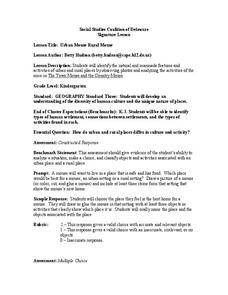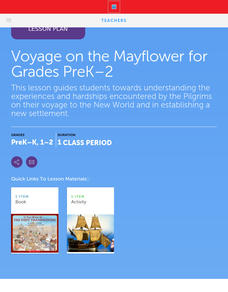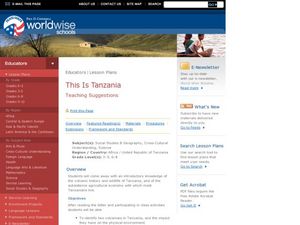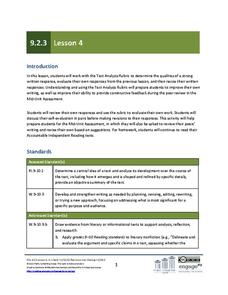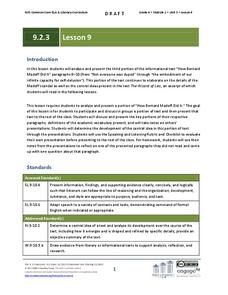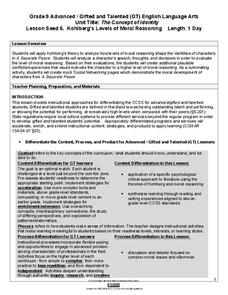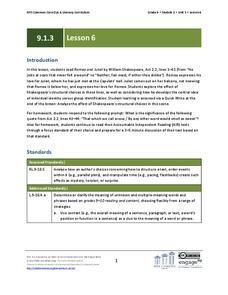Stanford University
Ruby Bridges
A two-part lesson features Civil Rights hero, Ruby Bridges. Part one focuses on the heroic actions of Ruby Bridges then challenges scholars to complete a Venn diagram in order to compare themselves to her. Part two begins with a...
Social Studies Coalition of Delaware
Urban Mouse Rural Mouse
Explore rural and urban environments over the course of four days. Each day offers a new look into how both environment compare and contrast. Activities include the observation and analyzation of images, a read aloud and grand discussion...
Scholastic
Voyage on the Mayflower
After completing an online activity about the Mayflower, scholars draw a picture about what they know of the Thanksgiving holiday, including a one-sentence summary. A reading of If You Were at the First Thanksgiving by Anne Kamma is the...
Curated OER
This Is Tanzania
Students explore Tanzania. In this geography skills lesson, students read This is Tanzania by Richard Lupinsky, Jr. and discuss the impact that volcanoes have had on the nation. Students analyze the imagery in Lupinsky's piece and create...
EngageNY
Grade 10 ELA Module 1: Unit 2, Lesson 6
Is history "little more than a relic," as one of the characters in "The Palace Thief" contends? Has Hundert's love of antiquity kept him from changing with the times? Readers consider how the author uses these conflicting views to...
Teaching Oasis
Gingerbread Baby Lesson Plan Guide
Reinforce reading comprehension and story mapping skills with the help from a story, Gingerbread Baby by Jen Brett. Individuals discover new vocabulary, make predictions, retell main events, respond to reading using a graphic organizer,...
Curated OER
Home Living / Daily Living: Dressing for the Weather
What to wear? Help your special needs class make independent choices about what they should wear during various weather conditions. They'll discuss weather-appropriate clothing, dress dolls for the weather outside, and even put on a...
EngageNY
Mid-Unit Assessment and Discussing Themes in Esperanza Rising: (Chapter 9: "Las Ciruelas/PLums")
Give this skills-based assessment halfway through your unit on Esperanza Rising. After a brief review, class members take the test, which asks them to show that they know how to analyze the novel independently. They are asked to...
Civil War Trust
Uncle Tom's Cabin
Through a careful reading and examination of Harriet Beecher Stowe's Uncle Tom's Cabin, scholars take part in grand conversations about the novel's contents, slavery, and the impact the book had on it. Furthermore, learners analyze an...
Ontario
Critical Literacy—Media Texts
Media texts convey both overt and implied messages. As part of their study of media, class members analyze the language, form, techniques, and aesthetics in a variety of media texts.
Missouri Department of Elementary
Feeling Faces
A lesson help scholars identify emotions through facial expressions. After a friendly puppet reads scholars a poem all about feelings, learners act out how they would feel when a specific action happens to them. Participants watch and...
Missouri Department of Elementary
Don’t Tease Me!
A whole-class discussion sheds light on school bullying and ways to prevent it. Scholars share a moment when they observed or experienced some sort of teasing. Pupils brainstorm ways such behavior can be stopped or prevented.
Curated OER
Let's Get it Together! Reading to Learn
Let’s learn about frogs! Young readers are led through “Freaky Frogs,” a non-fiction article. Teach learners how to edit an article so there are fewer details to sift through. After talking through the article, they learn the six steps...
EngageNY
Grade 9 ELA Module 1, Unit 2, Lesson 2
Class members continue their analysis of Letters to a Young Poet, paying particular attention to how Rilke uses metaphor to develop his ideas about the source of inspiration.
EngageNY
Grade 11 ELA Module 2: Unit 1, Lesson 14
Leave the past in the past. Scholars read paragraph 12 of the chapter "Of Our Spiritual Strivings" to analyze Du Bois's development of gaining liberty and leaving the ideas of the past. Pupils then carry out a three to five-minute...
British Council
Online Safety for Teenagers
Safety in a cyber world is complex but important. Scholars review ways to stay safe online by first writing words given by the teacher. Learners analyze the words to guess the topic of the lesson. They then read an online safety poster...
EngageNY
Grade 9 ELA Module 2, Unit 3, Lesson 4
What are the qualities of a strong written response to a prompt? Class members use the provided text analysis rubric to self-assess their responses to their homework assignments to prepare for the mid-unit assessment.
EngageNY
Grade 10 ELA Module 1: Unit 3, Lesson 4
Vivid quotes and strong sensory language compose Amy Tan's The Joy Luck Club, bringing the women to life as they navigate through issues surrounding identity and maternal relationships. Examine Waverly's relationship with her mother...
EngageNY
Grade 9 ELA Module 2, Unit 3, Lesson 9
Are we interested in crime stories because we either identify with the victims or enjoy watching the rich suffer? Do we feel guilty and want someone to take our blame and let us feel innocent? Groups investigate how the author of "How...
Maryland Department of Education
The Concept of Identity Lesson 6: Kohlberg's Levels of Moral Reasoning
How does our moral reasoning shape our identity? After a study of Kohlberg's Levels of Moral Reasoning, readers use Kohlberg's theories to analyze the speech, thoughts, and decisions of a character in A Separate Peace. They then create...
Newseum
The Making of Fake News: A Case Study
"Fake News" (stories that are entirely fabricated/fictional) is the subject of a case study of the search for Jestin Coler, the creator of some of the most famous fake news stories. After reading NPR's investigative report, scholars...
Utah Education Network (UEN)
Character Changes Lesson and iPad Assignment
Round, flat, static, dynamic. As part of a characterization study, scholars review the different types of characters and create a slide show demonstrating how a dynamic character in a story they have read changes throughout the tale.
EngageNY
Grade 10 ELA Module 1: Unit 3, Lesson 7
Track character development with an excerpt from Amy Tan's The Joy Luck Club. As tenth graders examine the relationship between Jing-Mei and her mother, they compare both characters' expectations of each other in the chapter "Two Kinds."
EngageNY
Grade 9 ELA Module 1: Unit 3, Lesson 6
The balcony scene from Romeo and Juliet takes center stage as class members consider the structural choices Shakespeare makes, i.e., having Romeo appear first in the scene and having Juliet appear unaware that Romeo is listening to her...



